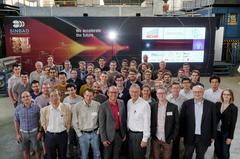URL: https://www.desy.de/news/news_search/index_eng.html
Breadcrumb Navigation
DESY News: DESY hosts meeting of the international collaboration for an accelerator on a chip
News
News from the DESY research centre
DESY hosts meeting of the international collaboration for an accelerator on a chip

Participants of the ACHIP collaboration meeting at DESY.
At their meeting, 52 experts from all over the world discuss the progress and their next steps in the development. Besides DESY and Hamburg University, the collaboration consists of Stanford University, the Friedrich Alexander University Erlangen, the SLAC National Accelerator Laboratory, the Paul Scherrer Institute (PSI), the University of California Los Angeles (UCLA), Purdue University, the Swiss Federal Institute of Technology in Lausanne (EPFL), the Technical University of Darmstadt and the Tech-X Corporation.
The project is supported by the Gordon and Betty Moore Foundation from the USA. Gordon Moore is known by Moore's Law, which describes the exponential growth of the number of transistors in computer chips over time. He is also one of the founders of the computer chip company Intel.



